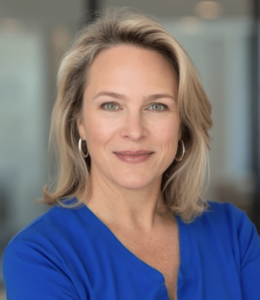
Elizabeth “Liz” Hanify’s journey into the financial world didn’t begin with spreadsheets or trading floors—it started with literature. A Harvard graduate with an honors degree in the humanities, Liz never imagined a future in finance. But a transformative experience supporting post-9/11 recovery efforts in lower Manhattan opened her eyes to the profound, real-world impact of financial systems. Today, as Senior Vice President of Capital Markets at Fidelity Investments, she brings a unique perspective shaped by empathy, adaptability, and purpose. In an interview with Traders Magazine, she shares insights from her unconventional path, her leadership philosophy, and how she’s helping shape the future of institutional brokerage services through innovation, inclusion, and bold thinking.
Can you share your career journey and what led you to your current role as Senior Vice President at Fidelity Capital Markets?
My career journey into capital markets is a bit unconventional. I graduated from Harvard with an honors degree in literature, Finance wasn’t even on my radar. Financial services felt both amorphous and intimidating, to be frank. But then, I had a pivotal experience supporting 9/11 recovery work in lower Manhattan. Seeing firsthand the impact that markets and bonds could have on rebuilding communities and the skyline – that truly shifted my perspective. It became clear to me the powerful role finance plays, and that experience became the springboard for my career journey, eventually leading me to the great Fidelity Capital Markets team with Fidelity Investments.
What do you believe are the most important qualities of a successful leader, especially in the financial services sector?
For me, it boils down to having a clear vision and being able to share it openly and directly with your team. It’s also about stepping up to drive things forward, tackle what isn’t working, but always keeping in mind that we’re all in this together. This isn’t a solo act: you’re Destiny’s Child, not Beyoncé. Personally, I’ve found the real magic happens when you balance careful consideration with decisive action – you need to think things through, but then you also need the courage to make things happen.
What are some of the most valuable lessons you’ve learned throughout your career that have shaped your approach to leadership?
Say what you mean and mean what you say. It sounds so basic, but that kind of straightforwardness really builds trust on a team. And then, you absolutely have to make space for people to disagree – to have those sometimes messy, but always important, candid discussions. Because the reality is, the best ideas rarely arrive perfectly formed. They usually come about through a bunch of different perspectives bumping into each other and creating something better than any one of us could have come up with alone.
What are the biggest challenges facing capital markets today?
Capital markets are constantly evolving, and right now, I think some of the biggest drivers are the rapid pace of technological change – the shift from voice trading to electronic automated platforms – and the ever-changing regulatory and macroeconomic landscape. While these shifts can be challenging, they’re also quite exciting as we figure out how to adapt and ultimately better market engagement.
What trends do you see shaping the future of institutional brokerage services?
There are three big trends that continue to shape our environment: market consolidation, how quickly technology is evolving, and the impact of regulations. These, in turn, are really driving a more efficient and responsive marketplace for institutional investors.
How is Fidelity Capital Markets leveraging technology and Al in trading and execution?
Fidelity Investments has been exploring and integrating AI into our work for quite a while now, focusing on how machine learning can improve the experience for our customers. In 2020 we launched our Bond Beacon platform, which provides end-to-end support for intermediary bond trading and management, enhancing portfolio management and institutional-grade liquidity. How to best leverage and incorporate AI technology and features is one of the enhancements we are actively exploring. But it’s important to remember that AI is just one part of the digital puzzle, and just one tool we hope to use to help us achieve our business goals.
What role do you see blockchain or tokenization playing in capital markets over the next few years?
Blockchain and tokenization present some interesting possibilities for making capital markets more efficient, and we’re actively exploring how these methods could enhance our new issuers, operations and offers to our clients.
What’s one piece of advice you would provide to young professionals in financial services?
Know your strengths – and own them. Believe in your capacity to learn; even if it feels unfamiliar now, dedication will get you there. And crucially, find your voice – don’t try to mimic someone else’s. Your unique perspective and how you articulate it are invaluable. Bring that voice to the table, and don’t hesitate to use it, especially when you have something important to say.







